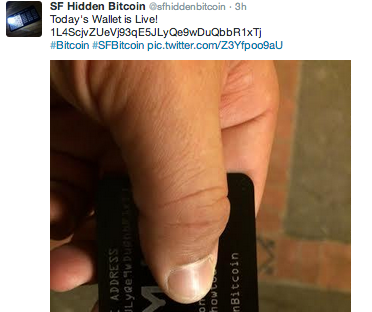Filed under: Technology, Currency, Breaking News
 If you missed out on the Hidden Cash treasure hunt last May,never fear. @SFHiddenBitcoin has arrived, transforming San Francisco into a gigantic bitcoins beta test. No one knows who is leaving the shiny bitcoin "wallets" around the city and posting tantalizing clues on Twitter. But the buzz is building for the daily crypto-currency scavenger hunt.
If you missed out on the Hidden Cash treasure hunt last May,never fear. @SFHiddenBitcoin has arrived, transforming San Francisco into a gigantic bitcoins beta test. No one knows who is leaving the shiny bitcoin "wallets" around the city and posting tantalizing clues on Twitter. But the buzz is building for the daily crypto-currency scavenger hunt.The wallets look like small sheets of aluminum with a QR code, a bitcoin address, and the hunt's twitter handle. Each wallet is reported to contain 0.0333 bitcoin, or about $20, which goes to those clever enough to figure out the clues. They can be discovered by following the hunt's Twitter account: @SFHiddenBitcoin.
@SFHiddenBitcoi posts the slogan: 'Bringing bitcoins to the people by hiding them. An educational experiment'. The profile tweets claim the scavenger hunt will go on for a month, with a new wallet tucked away in a new location (one's been spotted at Mark Zuckerberg's house) every day of July. They may need a new clue writer -- all of the cards have been located shortly after the clue was released.
Mainstreaming of bitcoin
This lighthearted contest adds another milestone to the mainstreaming of bitcoin. Over the last weekend in June, California Governor Jerry Brown signed into law a major milestone in commerce -- a bill that, like the Internet, "could change everything." Given that California is the eighth largest economy in the world with a staggering GDP, AB 129 is likely a game changer.AB 129 legalizes Bitcoins and other digital currencies for transactions in California.The "Lawful Money" law repeals a provision that banned the use of "anything but the lawful money of the United States."
Bitcoin's evolution of late has been rife with both potholes and possibilities. After a tenuous period during the collapse of Mt. Gox, government crackdowns, Silk Road bitcoin seizures, and even rumored crypto-currency-related deaths, a significant upturn began this spring.
E-commerce influencers such as Overstock, eBay, Apple, Google, Expedia and Yahoo took steps to recognize Bitcoin as legit. Bitcoin accelerators are quickly emerging via organizations like 500Startups, which recently funded five startups.
Then in April, MIT announced the Bitcoin Project, an experiment that provides every undergraduate student on campus with $100 in bitcoins. The central idea behind the Bitcoin Project is to work with professors and researchers at MIT to see how students use their Bitcoins when their whole community has them.